One startup’s quest to remove the stigma around mental health issues in Asia

COVID-19 started as a physical health pandemic but has also brought in its wake a mental health pandemic. Lockdowns, restrictions, layoffs, transition to the WFH model, struggle to maintain work and home balance, and the slew of changes this pandemic has brought in our physical world, has affected the mental health of many employees.
And getting help for it through therapy becomes even more difficult in a region like Asia where there is a heavy stigma attached to psychotherapy. The high cost is another story altogether. It is this gap that the digital mental health startup Intellect based out of Singapore aims to address.
Theodoric Chew, the Co-founder and CEO of Intellect says, “Intellect was founded after having personally been through therapy, reaping its benefits, and starkly realizing that most individuals and employees do not have feasible ways to get support for their mental health and wellbeing accessibly.”
Chew adds that there stands a huge gap in options available between the clinically distressed individual, and the average person that struggles with a multitude of common issues from stress, anxiety and mild levels of depression, to everyday hurdles like procrastination and self-doubt. The latter group typically do not and aren’t able to turn to any proper form of support. And some of the biggest factors driving these are the heavy stigma in Asia and the high costs of psychotherapy.
“We set out to pioneer a new way that allows anyone to easily and privately be able to work on their wellbeing and get additional support when they need to. Through working with leading psychologists and researchers, we’ve created a new form of digital therapy that serves this at scale,” adds Chew.
Today, Intellect works with organizations, teams, and individuals everywhere to support their mental health, wellbeing, and development.
On-demand mental wellbeing support entirely through an app
Intellect is a plug and play platform that provides on-demand mental wellbeing support entirely through an app. It is designed to be extremely easy and cost-effective to deploy to entire companies, be it 50 employees or 5000. Through the app, employees get access to 24/7 digitized therapy, fully self-guided, accessible anywhere, and anytime without the need for human intervention.
The app simulates in-person therapy in a digitally guided, self-serve, and session-based approach, also known as computerized cognitive behavioral therapy. So first the user takes a psychometric test and then gets a personalized training plan based on the results.

In addition, managers also get access to enterprise features that support the larger wellbeing and development of their teams, through comprehensive wellbeing insights and data-driven recommendations.
In a nutshell, the platform supports the wellbeing needs of the entire organization, with little requirement and oversight from HR or managers. It provides its partners with an end-to-end solution: from the initial deployment of the platform to continuous collaboration with HR to enhance employee wellbeing, engagement, and performance.
Banking on cognitive behavioral therapy and neuroscience for mental health
When it comes to how Intellect is different from other mental health providers. Theodoric reveals that unlike them, Intellect is a platform designed for preventative and early-stage support.
“We don’t aim to solely serve the 1 - 3% of employees that utilize EAPs but rather, our main focus is on helping the larger employee population in any company that does not currently have any primary options of turning to for their everyday wellbeing support.”
At the same time, he reveals that Intellect has a pricing model that is financially feasible for organizations to roll out company-wide for all employees.
Separately, Intellect strongly relies on science and research in ensuring efficacy and effectiveness in what it does. The platform draws upon cognitive behavioral therapy, neuroscience, and modern application methods in joint research studies with leading institutes that allows it to truly help employees and individuals.
The increased awareness for employee wellbeing during COVID
Given that the entire world is under mental duress, Intellect has seen a huge surge in demand and growth over the past few months, in large part due to the increased awareness for employee wellbeing during COVID and the rapidly changing work environment. Since going live earlier this year, today it works with over 15 companies to support their employees, ranging from startups to larger MNCs. Intellect has received a grant from government agency Enterprise Singapore and has raised an undisclosed amount of angel funding in its pre-seed round.
Given the stress on mental health created by the pandemic, Chew thinks that technology can be a tool to alleviate this. Mental health adoption has already been on an upward trend globally as well as in the corporate world, but the COVID-19 pandemic has drastically accelerated the pace and demand for employee wellbeing support, and very importantly in Asia where it’s long been stigmatized, he adds.
“What technology creates is a way to actually provide support to everyone in an organization effectively, affordably, and privately (rather than a small few) - as such we do foresee the uptake of digital mental health tech like Intellect going on an exponential rise over the next few years. It is on us to ensure we can provide an effective way to help companies and individuals do so.”
Chew’s enthusiasm is not unfounded. As per a recent Absolute Markets Insights report, the global mental health apps market is expected to gain a significant lift over the forecast period due to increasing awareness regarding the importance of mental health. In terms of revenue, the global mental health apps market is expected to reach US$ 3,918.40 Mn by 2027 owing to increasing levels of stress among societies. In that respect, startups like Intellect have their work cut for them and a huge potential to grow in the coming years.















